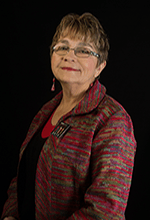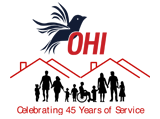Founding President and CEO
Enroll and Pay for Training
through the OHI Website
 Bonnie-Jean Brooks’ first Searsport High School essay turned into a prophecy guiding her professional and personal life even after she nears retired Jan. 2, 2022, after nearly 43 years as OHI President and CEO.
Bonnie-Jean Brooks’ first Searsport High School essay turned into a prophecy guiding her professional and personal life even after she nears retired Jan. 2, 2022, after nearly 43 years as OHI President and CEO.
“Do whatever I can to make life better for other less fortunate people in my beloved state of Maine,” she wrote as a young rural Mainer in the 1950s. While many young students profess similar aspirations, Brooks transformed word into action for Maine residents with intellectual and developmental disabilities and mental illness regardless of the personal sacrifice.
“When I took this position, I was a newly single parent of 8- and 12- year-old girls,” she said. “The challenge of raising two daughters and a brand-new nonprofit was overwhelming. I couldn’t be prouder that somehow we all managed to survive and thrive.”
OHI is an award-winning agency celebrating 43 years in May 2022. One daughter is an occupational therapist and the other a nurse practitioner. “On top of it all,” she added, “the state asked me 40 years ago to be guardian for a woman with multiple disabilities. I continue as her guardian today. I just shake my head and wonder how this could have all happened.”
Since 1979 to the present, extreme advocacy has been her refrain as OHI President and CEO. It was the first nonprofit in Maine to support twelve Class members who were institutionalized with the dual diagnoses of intellectual disabilities and mental illness – all residing in the Bangor Mental Health Institute (now Dorothea Dix Psychiatric Center) or Pineland Center Institution. She molded her personal philosophy into a corporate vision that serves as OHI’s foundation today – “Everything is Possible.”
During the past 42-plus years, Brooks provided consultation to public and private agencies in more than 30 states, one U.S. territory and four other countries; founded the Maine Association of ICF/MR Providers, now known as the Maine Association for Community Service Providers, a state provider association and formal affiliate of the Washington-based American Network of Community Options and Resources (ANCOR); served on the ANCOR Board of Directors from 1981 -2002 as a member, secretary, vice president of public policy, president and past president; elected as the ANCOR Foundation Board Vice President; represented ANCOR at Congressional hearings on Medicaid policy, housing issues, fraud and abuse investigations, the Fair Labor Standards Act and Occupational Safety and Health Administration issues; appointed by the Maine Department of Health and Human Services to its Federal Policy Impact Council; elected to the Board of Directors and served four terms of CARF, formerly the Commission on Accreditation of Rehabilitation Facilities where she was appointed to four international accreditation leadership advisory committees and five international advisory committees on residential, employment, children’s and outcome measurement standards; and served as a staff member to the President’s Committee on Mental Retardation now called the President’s Committee for People with Intellectual Disabilities (PCPID) and subsequently served for four years as a program consultant.
Just as the people OHI supports face and overcome challenges, so do successful service providers. In some respects, past challenges resurface over time while new one’s loom large. Brooks believes there is more than one big crisis bearing down on disability services in the near and more distant future.
“The workforce crisis is growing worse,” she said. “Funding constraints are a reality and will lead to bankruptcies, mergers, acquisitions, agency closures and changes in the characteristics of services. The country doesn’t have adequate resources or the will to fund services for Medicaid-funded populations at the level necessary and being requested. Leadership development is key to OHI’s continued existence.”
Brooks equally believes OHI is well prepared for the future and to confront these and other unknown challenges on the horizon.
“We have a strong, committed board of directors which functions as a true governance body that delegates day-to-day operations to its CEO and staff,” she said. “It has a steadfast, time-tested philosophy that values and continues to inform its decisions and actions. Its ethics and steadfast belief in always doing the ‘right thing,’ even when it’s painful, will continue to pay big dividends. It’s financially strong and relatively fiscally conservative. It’s dedicated to making ‘silk purses out of sow’s ears’ and finding creative, economical approaches to financial crises.”
One area where she feels needs more attention is empowering people supported and guardians as equal members with more responsibilities and representation in the agency.
“We don’t have acceptable representation of these stakeholders on our board, committees, or in policy development, public policy advocacy and in other operations,” she explained. “We also don’t make a great enough effort to connect people with natural supports. People with disabilities and their guardians want a voice and want to feel they are the leaders of their services.”
Through past and present challenges, a global pandemic and a nation-wide workforce crisis, OHI Direct Support Professionals (DSPs) serve as first responders for disability service providers.
“We have a mighty group of DSPs who are passionate about the difference they make in the lives of the people they support every day,” Brooks said. “They are well trained and committed to supporting people to achieve their goals.”
From the classrooms of a rural Maine high school to the chambers of Congress, Brooks has carried the torch of advocacy and social justice for all people with intellectual and developmental disabilities and mental illness. It’s no stretch to believe she won’t continue that journey as a consultant with the agency she nurtured from infancy far into the future.
